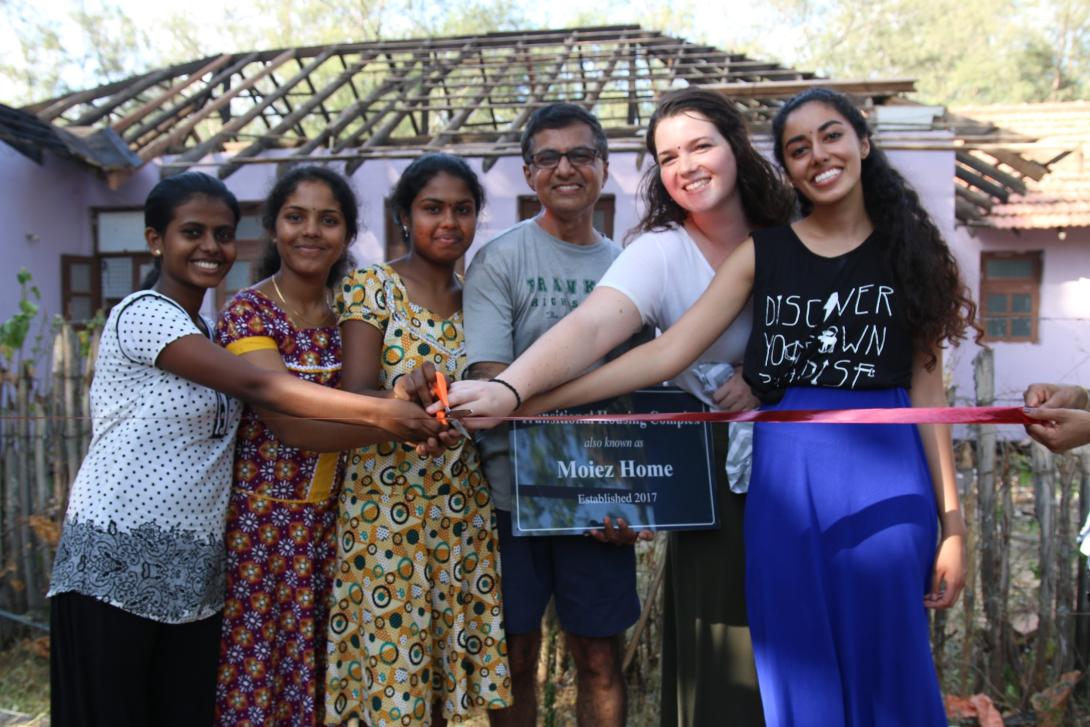We are now accepting applications for Summer 2025! You can find the application here.
Please consult this application guide to preview the application questions and to access relevant templates for your budget and community partner support verification.
The Ginsberg Center for Community Service and Learning is pleased to participate in the Davis Projects for Peace initiative. The Davis Projects for Peace were made possible by Kathryn Davis, an accomplished internationalist and philanthropist who was committed to providing the resources to today's student leaders for actionable project ideas. Mrs. Davis envisioned this program in 2007, when she was turning 100: "I want to use my 100th birthday to help young people launch some immediate initiatives that could bring new thinking to the prospects for peace in the world." Based on the success of the initiative, it continues now in her memory.
Projects for Peace are summer-long projects designed and implemented by undergraduate students passionate about peace in their communities and around the globe. The initiative hopes to prepare students as ethical global leaders by providing the resources to execute innovative grassroots project ideas. These projects, as defined by students, creatively address worldwide peace efforts providing sustainable solutions to contemporary society.
The University of Michigan is one of 90 universities participating; the University's selection committee will submit one student proposal and one alternate proposal to be considered for the 2025 Project for Peace awards.
The selected proposal will be eligible to receive a grant of up to $10,000 funded by the Davis United World Scholars Program.
Eligibility Criteria
Any undergraduate student (including current seniors), group of students, and/or any recognized student organization at U-M may submit a proposal.
Interested students and/or student organizations need to complete an application providing background about their project idea and community partnership(s). Applicants must also submit a 2-page proposal draft that creatively interprets the phrase "project for peace." Intentionally, no clear definition of "peace" is offered so as not to limit the imagination. We leave it up to the students to define what a "project for peace" might be; we hope the project reflects creativity, innovation and entrepreneurship.
The overall program is to be worldwide in scope and impact, but specific projects may be undertaken anywhere; special consideration will be given this year to grassroots projects based in Washtenaw County, southeast Michigan or other domestic locations. The proposal should include a 1-page budget (template included below) detailing how you would plan to spend the $10,000 grant.
Process Requirements
The process for grant funding with the Ginsberg Center is an interactive process, in which group members work with members of the Ginsberg Center team to increase the potential for positive, sustainable community impact. While the grant process is similar for both small- and large-scale initiatives, receipt of funding for a large-scale initiative may require more rigorous requirements. Requirements for any grant-funded groups include:
-
Attendance at a “Foundations of Community Engagement” workshop.
-
Regular meetings with Ginsberg Center staff; for the Davis Project that includes at least one meeting prior to nomination of your proposal. If the project is selected to receive funding, monthly meetings are required during the period of project completion (~April - September). Ginsberg staff or grantee groups may increase this frequency, as needed.
-
Submission of a post-project impact report that highlights the work done, learning/skills developed, budget, and community impact.
-
Submission of a final report to the Davis Project program officers, following instructions provided by the funder.
Application Components
The application for the Davis Projects for Peace initiative is now open and accepting proposals for Summer 2025.
In addition to the application questions, you will be asked to upload a 2-page project proposal, a budget, and a letter of support with your application.
Please include the following information in your project proposal:
Project summary: What issue(s) will be addressed? What approach(es) will be used? With whom will the grantee(s) work? What is the rationale for these choices?
Background: What is your working definition of peace? What preceded this proposal in terms of personal experience, forming relationships, developing knowledge, and other preparation?
Implementation: What plans have been made for use of funds, use of time, and contingencies?
Anticipated results: What are the potential short and long-term outcomes for participants, community collaborators, and grantee(s)? How will progress be monitored? How will the project contribute to peace?
Proposed Budget: You must also submit a proposed budget as part of your application. The budget template can be downloaded here, and you will upload it when you fill out your application. Please rename the budget template to something identifiable, such as Davis_2021_Budget_uniqname.xls.
Letter of Support: You must also upload a brief letter of support from a University faculty or staff member or community partner, highlighting your individual or organizational ability to carry out this project. Because this funding centers community-based initiatives, we prefer to see letters of support from community partners.
Deadline and additional information
All proposals must be submitted by 11:59 PM on Monday, December 2nd, 2024.
Additional questions may be sent to [email protected]. Note: The funder asks that you do not contact the national Davis Projects for Peace organization (at Middlebury College) about your project or submission to the University of Michigan. The Ginsberg Center manages the grant for the University of Michigan, and should be the point of contact for all U-M students.
For more information about the national Davis Projects for Peace program visit:http://www.davisprojectsforpeace.org/

